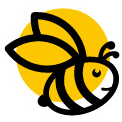Pollinator Conservation Resources for California
Overview
California’s native pollinators—including bees, butterflies, moths, beetles, birds, and bats—play a vital role in sustaining wild ecosystems and food production. The organizations and programs below provide guidance, data, and funding for pollinator habitat restoration, pesticide reduction, and community education.
1. Statewide Organizations & Programs
Xerces Society for Invertebrate Conservation
https://xerces.org
A leading authority on pollinator conservation and habitat restoration. Provides science-based planting guides, bee-friendly farming certifications, and policy advocacy.
California Native Plant Society (CNPS)
https://www.cnps.org
Promotes the use of California native plants through research, education, and community outreach. Publishes region-specific pollinator planting guides and nursery directories.
California Department of Fish and Wildlife (CDFW) – Pollinator Conservation Program
https://wildlife.ca.gov
Supports conservation planning for pollinators and habitat restoration on public and private lands.
USDA Natural Resources Conservation Service (NRCS) – Pollinator Initiative
(web page currently not available www dot nrcs dot usda dot gov/pollinators)
Offers technical and financial assistance to farmers, ranchers, and landowners to establish pollinator habitat through EQIP and other cost-share programs.
California Association of Resource Conservation Districts (CARCD)
https://carcd.org
Coordinates over 90 RCDs across California, many of which lead local pollinator and native planting projects.
2. Regional & Local Initiatives
Theodore Payne Foundation for Wild Flowers and Native Plants (Sun Valley, CA)
https://theodorepayne.org
A cornerstone of native-plant education and supply in Southern California. Offers native plant sales, classes, and habitat restoration projects.
Las Pilitas Nursery (Santa Margarita & Escondido, CA)
https://www.laspilitas.com
One of California’s oldest native plant nurseries; extensive online plant database with pollinator details.
Pollinator Posse (Bay Area)
https://pollinatorposse.org
Grassroots network providing habitat gardening workshops and citizen science events for pollinator awareness.
Ventura County Resource Conservation District (VCRCD)
https://www.vcrcd.org
Local initiatives promoting pollinator habitat restoration, especially following wildfires.
Los Angeles County Parks – Nature Gardens & Greenway Projects
https://parks.lacounty.gov
Supports native landscaping in urban settings and along greenways like the LA River and San Gabriel River.
3. Native Plant & Seed Suppliers
Pacific Coast Seed - South (Carpinteria, CA)
https://nativeseedgroup.com/who-we-are/pacific-coast-seed
Supplies California native and pollinator-friendly seeds for restoration and landscaping projects.
Hedgerow Farms (Winters, CA)
https://hedgerowfarms.com
Specializes in local ecotype seed for restoration and revegetation.
Rancho Santa Ana Botanic Garden (California Botanic Garden)
https://calbg.org
Offers native plant sales, habitat workshops, and pollinator exhibits.
Theodore Payne Foundation Store
(see above under Regional Initiatives)
4. Educational & Certification Programs
UC California Naturalist Program
https://calnat.ucanr.edu
Offers certification courses that train stewards in ecology, pollinator biology, and restoration principles.
UC Master Gardener Program of California
https://mg.ucanr.edu
Trains volunteers in sustainable gardening and pollinator-friendly landscaping practices.
Monarch Joint Venture – Monarch Conservation Webinar Series
https://monarchjointventure.org
National resource for monarch habitat conservation, often partnering with California agencies.
Audubon California
https://ca.audubon.org
Provides bird-friendly and pollinator-friendly native plant lists and community garden guides.
5. Research & Data Resources
UC Berkeley Urban Bee Lab
http://www.helpabee.org
Documents wild bee diversity across California and provides identification tools and planting lists.
California Pollinator Coalition
https://www.pollinator.org/california-pollinator-coalition
Partnership among agriculture, government, and conservation groups promoting pollinator protection on working lands.
USGS Native Bee Inventory and Monitoring Lab
https://www.usgs.gov/centers/eesc/science/native-bee-inventory-and-monitoring-lab
Provides open data and identification guides.
6. Volunteer & Citizen Science Opportunities
iNaturalist – Pollinator Projects (https://www.inaturalist.org)
Upload and share pollinator sightings with scientists and the public.
Monarch Watch Tagging Program (https://monarchwatch.org)
Tracks monarch butterfly migration across North America.
Chronolog Pollinator Photo Stations (https://www.chronolog.io)
Crowd-source photo time-lapse data to track habitat growth and restoration progress.
7. Funding & Grant Opportunities
Wildlife Conservation Board – Pollinator Habitat Program
https://wcb.ca.gov Offers grants to enhance pollinator habitat on working and natural lands.
NRCS EQIP & CSP Programs (website offline)
Environmental Quality Incentives Program (EQIP)
Conservation Stewardship Program (CSP)
California NRCS Pollinator Resources Page: Financial incentives for farmers, ranchers, and private landowners who establish or enhance native flowering plants, hedgerows, and other pollinator-friendly practices.
CAL FIRE Forest Health & Urban Forestry Grants
Include pollinator habitat as eligible components in reforestation and green-infrastructure projects.Forest Health Grants (website offline)
Urban and Community Forestry Program: https://www.fire.ca.gov/what-we-do/grants/urban-and-community-forestry-grants Provides funding for reforestation, green infrastructure, and urban tree planting projects that can incorporate pollinator-friendly vegetation.
Local RCDs and CNPS Chapters
Periodically offer native seed or small grant opportunities for community habitat projects.California Association of Resource Conservation Districts (CARCD): https://carcd.org Find your local RCD using the CARCD directory — many districts offer native seed giveaways, mini-grants, or technical support for habitat projects.
California Native Plant Society (CNPS) – Local Chapters: https://www.cnps.org/chapter Individual CNPS chapters often provide small community grants, volunteer planting events, and seed exchanges that support pollinator restoration.
